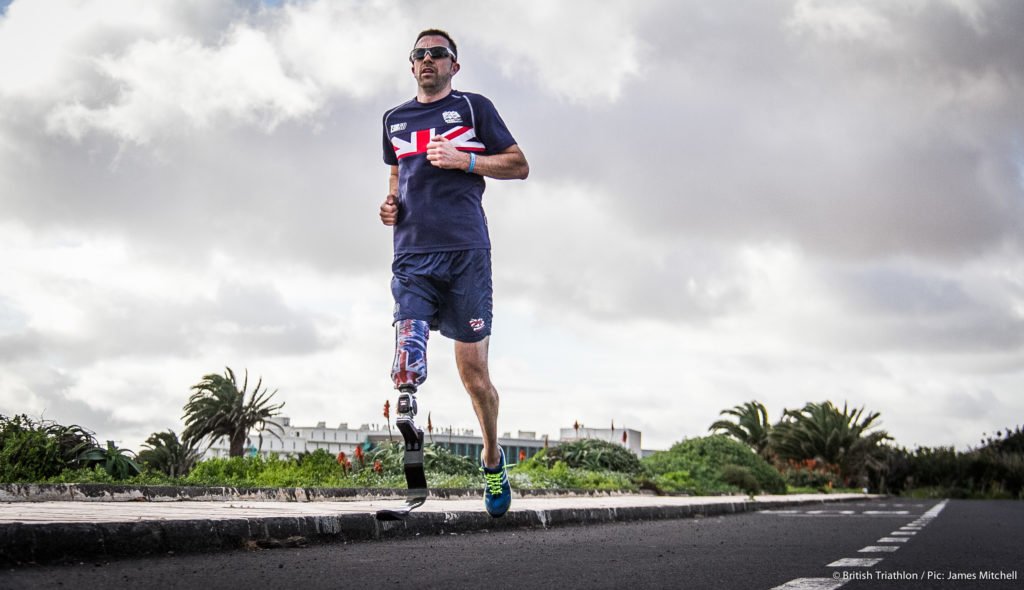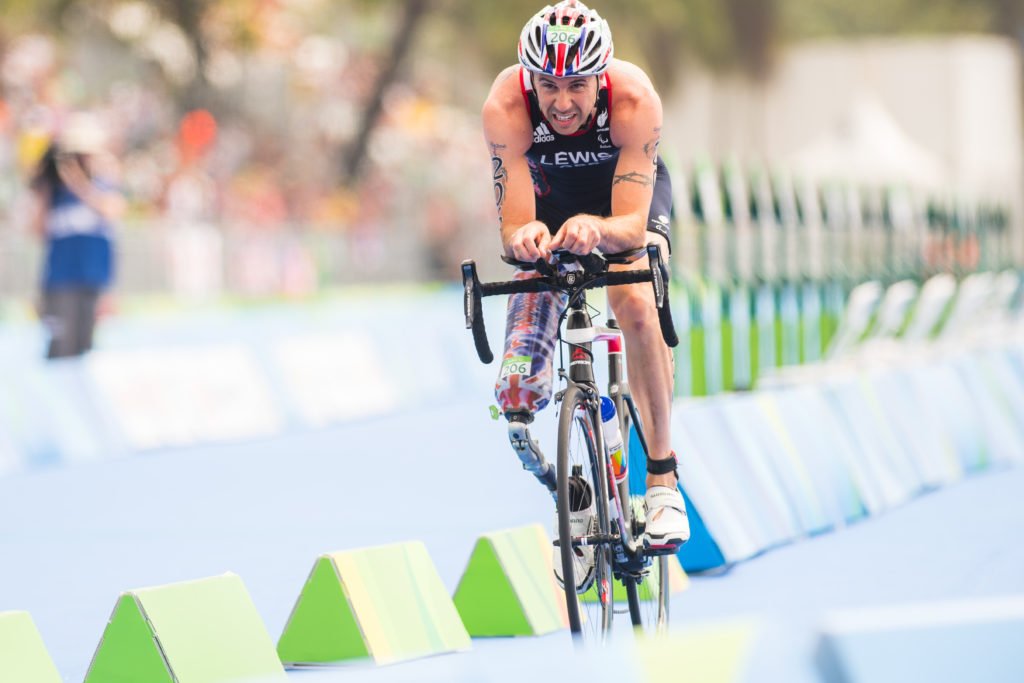Team GB athlete, Andrew Lewis, is a Paralympic gold medal-winner, claiming the first ever triathlon title when it was introduced at the 2016 Games in Rio. In an exclusive interview for his sponsor Yellow Jersey, Lewis spoke to us about keeping honest during training, his need for other people around him and who he is deep down.

When I call him up it just so happens to be Andy Lewis’ birthday – and while he tells me it’s technically a ‘rest day’ for him, he’s had a long day spent fulfilling various sponsor obligations and doing some filming for British Triathlon. I’m struck that there are probably other things he’d rather be doing on his birthday than talking to me.
This isn’t to say that Lewis isn’t warm and friendly as soon as he picks up the phone, but it really throws into sharp relief the sacrifices a Paralympic athlete must make. I wonder how Lewis keeps himself focused through a four-year competitive cycle, foregoing the birthday festivities that a typical 35-year-old father of two might enjoy, all for a single day’s competition that is still two years away.
“At times it is difficult to keep yourself motivated I suppose. You’re always trying to find things to keep yourself focused and I suppose the only way for me is to secure European Champs, World Champs, that sort of stuff, just to keep myself in the right frame of mind. It is quite difficult. I think the one thing going forward is you’ve got to forget – Tokyo is such a long way off. Yes, I know that’s the goal, but for me it’s about understanding my smaller goals that link to that. And I think that’s where people go wrong sometimes. They have this big goal, big vision and they don’t have the process goals that lead to it.
“For me, I don’t know what others would say, but I have to have training partners. For me it’s very difficult training on my own sometimes because I like the banter, I like the camaraderie between athletes. If I didn’t have that it would be very boring. I also find you can learn a lot from each other and help people out.”
Lewis is hugely interested in other people, that much is clear from the way he talks about everyone from his teammates in the British Triathlon setup to the kids with whom he works, and the business leaders he has begun mentoring.
“It feels as though it’s part of my job. Winning that Gold Medal in Rio wasn’t just about going out and winning Gold. As soon as that happened, I needed to then go out there and show people that they could achieve, too. I have to inspire the next generation. And for me, it’s not about ticking a box for UK Sport. It’s a part of me, as a person and as a dad. I’ve got two kids, Logan is 3, Jasmine is 10. I need to help other people I think, and to be honest I think I’m pretty good at it.
“I do a lot of school visits, I’m a mentor to a few different athletes. I’m actually doing my Level 2 triathlon coaching course at the moment. So I think from what I’ve learned, from three and a half years ago to where I am now, I’ve changed as a person. Inspiring the next generation and encouraging people to get active is part of my values.”
Lewis was not born a para-athlete, his leg was amputated through the knee after he was hit by a lorry. Up to that point he had been intent on a career in the military to the detriment of his education. After the accident he suddenly found himself with no qualifications and nowhere to go. It was, of all things, learning to fly aeroplanes that showed him the way.
“I literally found myself in a big hole asking, ‘how do I dig myself out?’ I applied for a flying scholarship. I did it in one month in the UK and that was sort of what I needed – a kick up the arse and a bit of a confidence boost. It made me realise, ‘flippin’ heck, if I can go out there and learn to fly an aeroplane and get my pilot’s licence, what’s saying that I couldn’t win a Paralympic medal?”
“I realised then that if I wanted to achieve something, I could do it. And do you know, you don’t need the best coaches in the world, you don’t need the best equipment in the world, you don’t need the best training venues in the world. It helps, but if you haven’t got the will to go out there and push yourself to your body’s limits to achieve those things, having the equipment is the secondary. You don’t need those things, it’s in your heart, really. If you haven’t got that, there’s no point in trying in the first place.
“I wanted that Paralympic medal so much because I thought it would change my life. I thought it would open up doors on how to progress into my future. I believe it does that in one sense, because it’s made people sit up and listen to me when I talk to them about things, or it’s made businesses and people when I go and talk to them realise that actually this guy had nothing, and he came away with a Paralympic medal two and a half years later.”
Despite working his way through his triathlon qualifications, Lewis says he has more to offer than sports coaching.
“I can give more than just be a triathlon coach. One of the things I want to do is start up my own business mentoring. I’d like to be a mentor, whether that be in sport, in business, in schools, or whatever. I just think that me mentoring people could really benefit them. I’ve recently done it with adults and business leaders in London as well. Elite sport is very similar to business. So going into a business and talking to people about mentoring them and guiding them, what you’ve been through is very similar to their business. You have to show them where it fits into their business.”

We discuss the problems some long-term athletes have when leaving an Olympic programme, with Lewis quick to point out the rising number of former elite competitors who struggle to adapt to life in ‘the real world’. When asked whether he thinks of himself as a triathlete (as opposed to a father, or something else), Lewis’ answer is typically down to earth.
“I’m definitely both. I could take it or leave it, triathlon, but I can’t do that with my kids. I now feel like I was born to be a triathlete. I was a runner all my life, as a kid I used to be in the cross-country team, county team, nationals, I did a lot of cross-country. I did that until I was 16 then I was going to go into the military, so I was pretty fit anyway, but I’ve always been an endurance athlete.
“I am a born racer. Ultimately, I do the training because I have to do it to win, but I am a born racer. Once I get out on that circuit, it’s just me against the world; I’m on my own. You can’t buy or learn that race mindset. It’s very difficult to have. Yes, you can be competitive, but it’s not necessarily about being competitive. It’s about when to go hard, when to back off, when to talk to your competitors, when not to. When you’re on the start line, how to make yourself seem more confident than other people. It’s all about racing. Everything is.”
While he might claim to be a racer to the bone, from speaking to Lewis for just half an hour I’m inclined to say that, actually, he’s a more born leader than born racer. Here is someone for whom competition is part of life, but who never hesitates to help up others along the way. Tokyo may still be two years away, but you get the sense Lewis will be aking a difference and inspiring future generations m well after that.
Andy will be competing on home soil when Great Britain hosts a round of the ITU Paratriathlon World Cup at Eton Dorney on Monday 28 May. The event will feature many of the world’s best paratriathletes, as well as providing an essential development opportunity for aspiring triathletes and paratriathletes who are keen to try the sport.